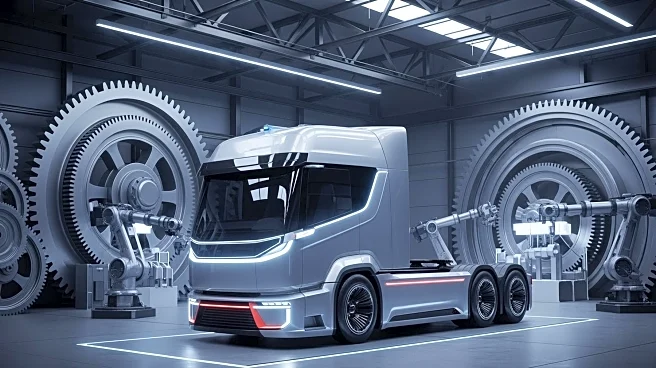What's Happening?
Pony.ai, a Chinese autonomous driving company, has announced plans to enhance its autonomous truck production capabilities. The company is collaborating with SANY Heavy Trucks and Dongfeng Liuzhou Motor
to develop a fourth-generation family of automated trucks. These trucks will be based on advanced all-electric platforms, with a goal to mass-produce 1,000 units. Pony.ai aims to advance autonomous trucking technology and facilitate large-scale unmanned commercial operations. The new truck kit will use automotive-grade components, sharing parts with its Robotaxi system, which is expected to reduce costs significantly. Recently, Pony.ai launched seventh-generation L4 autonomous vehicles in Shenzhen, marking the city's first intelligent connected vehicle pilot project. The company also achieved a production milestone with its 300th ARCFOX Alpha T5 Robotaxi, developed with Beijing Automotive Industry Corporation.
Why It's Important?
The development of autonomous trucks by Pony.ai represents a significant advancement in the autonomous driving industry, which is becoming increasingly competitive. With major players like Waymo and Tesla also in the race, Pony.ai's efforts to reduce production costs and increase efficiency could position it as a key player in the market. The American Trucking Association reports that nearly 15 million trucks transported 72.7% of the nation's freight last year, generating $906 billion in revenue. The autonomous trucking market in North America is projected to reach $65.4 billion within a decade, highlighting the potential economic impact of Pony.ai's initiatives. Successful implementation of autonomous trucking technology could revolutionize logistics and transportation, offering cost savings and efficiency improvements.
What's Next?
Pony.ai's partnership with SANY and Dongfeng is expected to accelerate the production of autonomous trucks, with plans to mass-produce 1,000 units. The company is likely to continue expanding its fleet and enhancing its technology to maintain competitiveness in the autonomous driving sector. As the market for autonomous vehicles grows, Pony.ai may face increased competition from other companies, prompting further innovation and strategic partnerships. The success of its pilot projects in Shenzhen and the production milestone of its Robotaxi fleet could pave the way for broader adoption of autonomous vehicles in urban areas.
Beyond the Headlines
The push for autonomous trucking by Pony.ai could have broader implications for the transportation industry, including potential shifts in employment patterns and regulatory challenges. As autonomous vehicles become more prevalent, there may be ethical and legal considerations regarding safety, liability, and the impact on traditional trucking jobs. Additionally, the integration of autonomous technology into existing infrastructure will require collaboration between companies, governments, and regulatory bodies to ensure safe and efficient operations.










